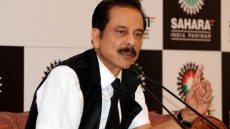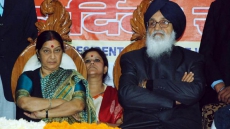New vigour is sweeping through Indian government offices after Narendra Modi became the prime minister with ministers conducting surprise checks to see if bureaucrats are in their seats in time and offices being kept clean and tidy to give an air of efficiency, a Chinese daily said Tuesday.
“Ministers are conducting surprise checks in the morning to see if bureaucrats are in their seats, offices are being thoroughly cleaned and all old furniture thrown away, senior officials are under orders not to keep files pending, and ministers are clearing files, including many left over from the previous government, in a jiffy,” the New Delhi-datelined article, headlined “Indian bureaucracy shaken up, more transparent after election win” in the Global Times stated.
It noted how Modi was putting in an 18-hour work day from 5.30 a.m. till after 1 a.m.
“Government officials have been ordered to clock in at 9 a.m. everyday, and are expected to sit beyond 6 p.m. - when the day is supposed to end - to clear any extra work. Saturdays are no longer holidays and the officials frequently take work back home. Senior bureaucrats, like the secretary of any department, have to ensure that the precincts of the office are spic and span - no dust, no old furniture lying around, no paper files piled up on desks, no betel leaf-stained corners,” said the newspaper, an English-language publication from the People's Daily, the official organ of the Chinese Communist Party.
Chinese media has been paying a lot of attention to the new Indian government and chronicling its various moves and policies.
“The prime minister has also directed that officials should take to the electronic way to clear files. Tech savvy Modi, 63, has directed that officials should not have piles of files littering their desks and everything should be computerised.”
The longish article particularly highlighted Modi's fetish for cleanliness. “All offices were sent a letter via Cabinet Secretary Ajit Seth asking officials to keep their offices clean, papers neat, and corridors unblocked,” it said.
Modi himself has been keeping tabs on office cleanliness, it said, adding: “During his (Modi's) initial days in office he took rounds of the Prime Minister's Office, walking the corridors and looking into every room - something that his predecessors are not known to have done.”
Modi reportedly frowned at the unkempt corners, the piles of dirty tea cups and plates, and loitering officials. The Chinese themselves have a fetish for cleanlineness and Chinese visitors to India are struck by the squalor and litter of public spaces in Indian cities.
It pointed out how “lower-level bureaucrats and their aides under the previous regimes were notorious for their long breaks”.
“During winters, the sprawling lawns near the central government offices in Delhi would be filled with government officials - chatting, eating, and napping - during the prolonged lunch time, while senior officials would be off to exclusive clubs or golf clubs.”
As for officers getting to office in time, it cited the example of Urban Development Minister M. Venkaiah Naidu reaching office early and finding many offices empty.
“Last month, Urban Development Minister M. Venkaiah Naidu reached his ministry office in Nirman Bhawan at 9 a.m. and found the offices of many officials empty."
“The minister found electric wires dangling in the corridor and expressed his unhappiness at the shabbiness of the premises. Meanwhile, Information and Broadcasting Minister Prakash Javadekar arrived at his ministry office in Shastri Bhavan at 9.15 a.m. late last month to find many vacant chairs," the newspaper noted.
“A circular was also issued to officials warning them that disciplinary action would be taken against them if they are late again,” it said.
"Under the previous government, most officials would arrive at 11 a.m. or even later and be off by 6.30 p.m. They would never work on Saturdays, unless necessary. Now, everyone is in office on the dot in the morning. The senior officials stay till 8 p.m. and work regularly on Saturdays and, if required, even on Sundays," the article quoted a senior bureaucrat as saying on the condition of anonymity.
"Everything is moving fast under the new government - files are being cleared in minutes, decisions taken fast. The top officials are inspecting their offices, even the toilets, to ensure everything is neat and clean. Under the previous government, no one seemed to work. Most of the officials are welcoming about the new work culture," another official said.
According to Minister of State for Home Kirren Rijiju, all these do not mean that India's new prime minister was trying to centralise power.
"Some people might be saying that Modiji is trying to centralise power, it's totally wrong,” the article quoted Rijiju as saying.
"Discipline and close coordination within a system cannot be termed as dictatorial in any manner. We are trying to bring some discipline in our working system, everything is being streamlined. It has to be seen from this perspective," he said.
The daily also highlighted how French Foreign Minister Laurent Fabius remarked on the perceived efficiency of the new government.
“Fabius, voicing keenness that the new Indian government should conclude a multi-billion dollar deal for fighter aircraft that has stalled for two years, said France shared the 'notion of efficiency in the new government's approach'," it stated.
It also noted that “Modi's government is far more visible than previous governments”.
“He has two Twitter accounts -@narendramodi, from when he was chief minister of Gujarat, which has over 5 million followers, and @PMOIndia, after he became prime minister, which has nearly 2 million followers," the daily noted.
“The two handles are constantly updated and are a constant source of information to the public. Most of his ministers have also opened Twitter accounts to keep the public updated,” the article concluded.





